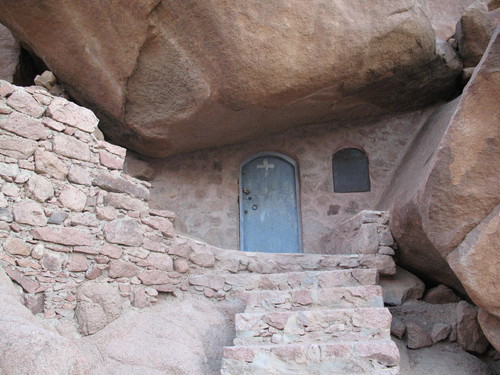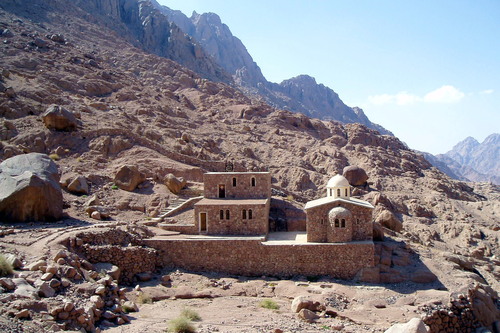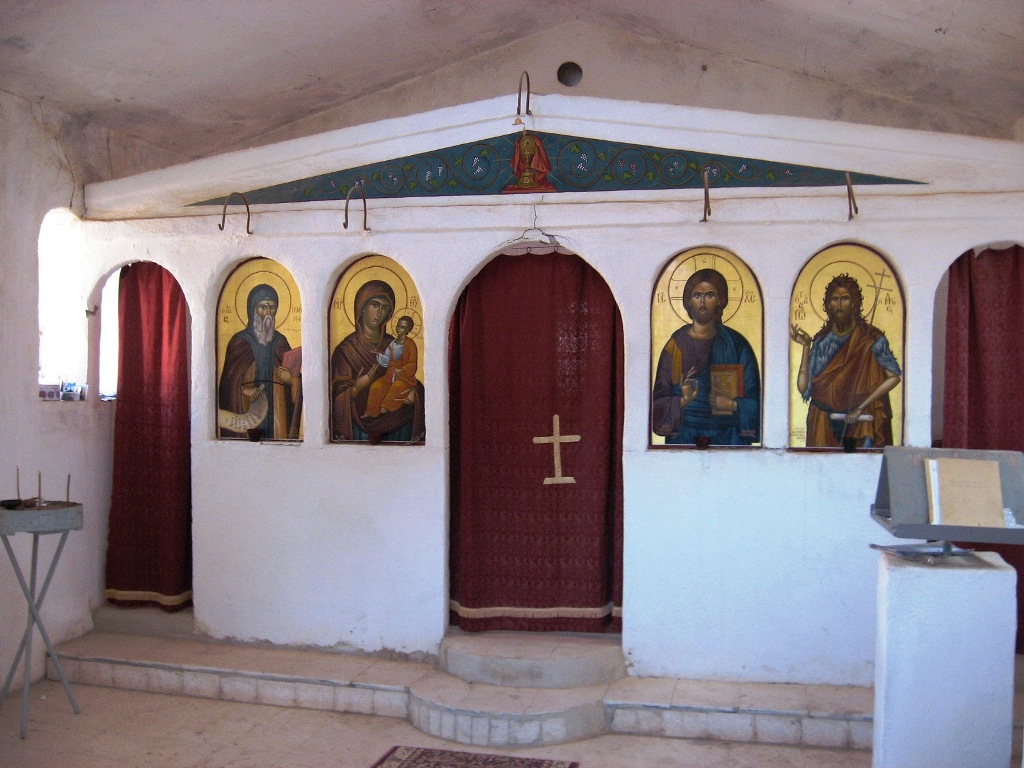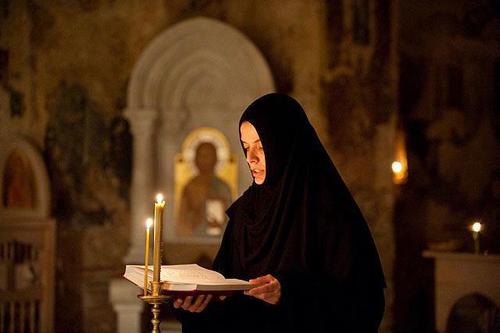
In August 1963, 75 people from Livanata came to visit the Monastery. They worked on the cistern of the Monastery, the spring of Holy Water, fervently. Many from Livanata, the homeland of St. David of Evia, had vowed to offer something to the Monastery of their compatriot, either money or work. Thus, these 75 men came to work on the cistern. And in the Monastery there were another 15 people helping them. Fr. Iakovos was coordinating the work, but he was the only one who could prepare the food during the stay of these good people.
He realized that soon there would be nothing in the pantry. After one day the food was finished, and he did not have any money. He looked in all of the cupboards, all of the corners. He was able to only find 2.5 okas [about 3.25 kilograms] of orzo. And he found half a loaf of bread. Elder Euthemios also have him half a loaf. This would have been a comical amount for the roughly one hundred people who were doing manual labor the whole day.
He was worried and didn't know what to do. He was filled with doubt and was on the verge of crying, that he would have to leave all those people hungry. Immediately, however, he was struck with an idea: he picked up a pan and put the orzo in it, along with the bread the way it was, and he went to the church. He stood before the icon of St. David and told him:
"My Saint, these people are working in your Monastery. They will return tired and hungry. I have nothing else to give them to eat, other than these 2.5 okas of orzo with a little oil, and these two half-loaves of bread (as he showed them to the Saint). I entreat you, bless them, that all of them might eat and be filled."
He cooked in that pan, and they served all the food from it, and it was not emptied. All of the people were filled from that half of a pan, and there were leftovers! Many witnessed this, including the current abbot Fr. Kyrillos. Many years later, speaking of the miracles of St. David, Fr. Iakovos said: "My brother, once again there was the miracle of the feeding of the five-thousand!"
Through the prayers of our Holy Fathers, Lord Jesus Christ our God, have mercy on us and save us! Amen!
http://full-of-grace-and-truth.blogspot.ca/search/label/Elder%20Iakovos%20Tsalikis
Λοιπόν, όταν εσύ δεν αμαρτάνεις, δεν ψεύδεσαι, δεν κατακρίνεις, δεν πονηρεύεσαι κατά του πλησίον σου, τότε έχεις φόβο Θεού. Τότε είσαι σοφός και κατανοείς το Θεό, και για να μην Τον λυπήσεις δεν αμαρτάνεις. Και αυτή είναι η όραση του Θεού, και ο Θεός που βλέπει τα πάντα σε σκεπάζει από τις παγίδες του σατανά.
Όλες τις θλίψεις, παιδί μου, αν τις υπομένουμε, βρίσκουμε Χάρη παρά Κυρίου. Γι αυτό μας αφήνει ο Κύριος να πειραζόμαστε, για να μας δοκιμάζει και να μας πλέξει στεφάνους.
Παραιτήσου από το δικό σου θέλημα, για να βρεις ειρήνη ψυχής. Γιατί το θέλημα του ανθρώπου έχει γίνει χάλκινο τείχος και εμποδίζει το φωτισμό και την ειρήνη Όντως μέγα είναι, στ αλήθεια, το μυστήριο της υπακοής! Αφού ο γλυκύς μας Ιησούς πρώτος χάραξε το δρόμο και έγινε παράδειγμα για μας, πόσο μάλλον εμείς είμαστε οφειλέτες να Τον μιμηθούμε.
Ο μοναχός δεν αλλάζει τόπο κατοικίας, χρώμα ενδυμάτων και ιδίως νοημάτων. Ο μοναχός και η μοναχή αλλάζουν νουν και καρδιά μαζί. Δε σκέφτονται όπως οι κοσμικοί. Όλη η δύναμη της ψυχής είναι η προσευχή. Και καθώς το σώμα δυναμώνει με τις τροφές και τα διάφορα καρυκεύματα που του προσφέρουμε, έτσι και η ψυχή μας θέλει ευχή, ανάγνωση, λόγο προφορικό, να βλέπει παράδειγμα και έτσι λίγο-λίγο ξυπνάει Με πολλή απλότητα να πορεύεσαι, για να βρεις την καθαρότητα της ψυχής.
Η απλότητα είναι μεγάλη ευτυχία για την ψυχή Τους μεν κανόνες οι άνθρωποι τους κατάργησαν, αλλά δεν τους κατάργησε ο Θεός. Μένουν, όπως τους έθεσαν οι Πατέρες και οι θείοι Απόστολοι. Επομένως να τους φυλάττουμε, αν θέλουμε να σώσουμε την ψυχή μας, για να μη βρούμε αντιμέτωπο το Θεό να υπερασπίζει τους νόμους των αγαπητών Του δούλων.
Το στόμα σου αδιαλείπτως να μελετά την ευχή: Κύριε Ιησού Χριστέ, Υιέ του Θεού, ελέησόν με Με την ευχή, θα καθαρίσει ο νους σου και θα την κατεβάσει στην καρδιά και θα γίνει διαδρομή, ένωση νου, λόγου και καρδιάς, και θα γίνει Παράδεισος μέσα σου. Από τη στιγμή που αρχίζουμε να διαπράττουμε την αμαρτία γινόμαστε δούλοι των δαιμόνων.
Ο φιλάνθρωπος Θεός έκανε τον άνθρωπο αυτεξούσιο και μας δίδαξε να μη μετέχουμε σε πράξεις αισχρές και δε σκεπτόμαστε σοβαρά τα θεία και σωτήρια λόγια Του. Δεν υπάρχει άλλη θυσία τόσο ευώδης προς το Θεό, όσο η αγνότητα του σώματος. Τίποτε άλλο δε μισεί τόσο ο Θεός, όσο την παράνομη ηδονική ακαθαρσία του σώματος.
Σ αυτή τη ζωή είναι αγώνας. Με τα ακάθαρτα πνεύματα πολεμάς, που δε σου ρίχνουν γλυκά και λουκούμια, αλλά σφαίρες οξείες που θανατώνουν ψυχή, όχι σώμα.
Γέροντος Ιωσήφ Ησυχαστή
http://agapienxristou.blogspot.ca/2013/04/blog-post_16.html

Δεν πάει πολύς καιρός που ο Αγιος Νεκτάριος εμφανίστηκε σε ένα ευλαβέστατο κληρικό και του παραπονέθηκε.
- Οι Αγιοι είμαστε υπο σύνταξη πιά......Οι άνθρωποι δεν προσεύχονται σε μας, δεν μας παρακαλούν, δεν μας ζητούν τίποτε,δεν μας δίνουν εργόχειρο. Δεν μας δίνουν την ευκαιρία να προσευχηθούμε στο Θεό γι` αυτούς.....
ΒΙΒΛΙΟΓΡΑΦΙΑ. Ο ΘΕΟΣ ΕΙΝΑΙ ΜΑΖΙ ΜΑΣ, ΕΜΕΙΣ ΕΙΜΑΣΤΕ ΜΑΖΙ ΤΟΥ;
ΕΚΔΟΣΕΙΣ ΟΡΘΟΔΟΞΟΣ ΚΥΨΕΛΗ
http://apantaortodoxias.blogspot.ca/2014/02/blog-post_3314.html

St. John Climacus lived in the late sixth century and the first half of the seventh century; he is remembered by Christians everywhere especially during the Great Fast, for the purity of his life dedicated entirely to Christ. St. John Climacus was born around or before the year 579 and lived until 649. At age of 16 he entered the Sinai Monastery under the supervision of abbot Martyrium. After the death of his abbot, St. John Climacus withdrew into the desert to a cave located at the foot of Mount Sinai, living in meditation, prayer and study for nearly 40 years. In 639 he was named abbot of the monastery of Sinai, but not long after he retired in his old cave where he struggled until falling asleep.

The tradition mentions a cave located in the Valley of Tholas (Wadi Et-Tlah) approximately 8 km from Saint Catherine’s Monastery of Mt. Sinai, as the place where St. John led his ascetic struggle.

The first written document where this cave is mentioned, also remembers it as a place of pilgrimage. In the twentieth century, a monastic settlement was raised near this cave, belonging to the Monastery of Saint Catherine.

Named after the Monastery of Sinai, St. John was also called the Climacus or scholar because of his vast culture, but mostly he was called ‘the Ladder’, due to his work, ‘the Ladder of Divine Ascent’.

“The Ladder of Divine Ascent” or the ladder towards Heaven is the most important work of Blessed John, which became an ascetical model for both monks and laymen. In this book St. John describes the spiritual ascent towards heaven as going through 30 steps, a clear reference to the 30 years of the life of Christ, before beginning His public ministry. ‘The Ladder’ begins with an introduction on monasticism, focusing on renouncing the world and on self-denial. The following 23 chapters of this book deal with sins and virtues in a successive order. St John affirms that these steps are not to be regarded as steps that can be left behind, but as spiritual states that need to be maintained and deepened, and to the extent of this understanding, one can advance further.
St. John Climacus is commemorated every year on March 30th, and on the fourth Sunday of Great Lent.
http://agapienxristou.blogspot.ca/2013/04/the-cave-of-saint-john-of-ladder.html

“Seeing they do not see and hearing they do not hear…” (Matt. 13:13)
This is Jesus’ description of those who encountered Him but did not understand. Just because we see something doesn’t mean we see it. Just because we hear something doesn’t mean we’ve heard it. This is particularly true of Holy Scripture. Just because we read it doesn’t mean we’ve read it.
Why do we read the Scriptures?
I assume that anyone who is “reading the Scriptures” is, in fact, a believing Christian, otherwise they would just be reading a collection of ancient writings held in esteem by Christians. For the books of the Bible to be “Scripture” is to say that they are considered somehow inspired and somehow authoritative. But to read them as Scripture also asks the question: “Whose Scripture?” The answer is, “The Christian Community’s – the Church’s.”
Some point famously to Paul’s admonition to Timothy:
All Scripture is given by inspiration of God, and is profitable for doctrine, for reproof, for correction, for instruction in righteousness, that the man of God may be complete, thoroughly equipped for every good work (2 Tim. 3:16-17).
However, this is the admonition of an Apostle to a Bishop. “Doctrine” (“teaching”) is not the task of every Christian. Instead we are told that not many of us should be teachers (James 3:1). St. Paul urges believers at various times to give heed to the “doctrine” that they have received (Romans 16:17; 1 Timothy 1:3; 1 Timothy 4:6; etc.).
In our modern culture, many Christians act as though they have a major task in life to learn doctrine, meaning to once again study the Scriptures and come to their own conclusions about everything under the sun. It is as though Martin Luther was reincarnated multiple times in every generation.
Doctrine, sound teaching, is the “pattern” of teaching which has been delivered (traditioned) to us. We find witnesses to this teaching in the Fathers from the first century forward. The reading of Scripture is not the means whereby we arrive at sound doctrine – sound doctrine is the means whereby we rightly read the Scriptures. The Christian reading of Holy Scripture is a “doctrinally-ruled” reading. We do not come to the Scriptures to decide whether the Nicene Council “got it right.” Without a knowledge of doctrine, much of Scripture will remain closed to the reader.
But there are ways of reading Scripture that are appropriate and generally essential to the Christian life. “Search the Scriptures, for in them you think you have eternal life, and these are they which testify of me,” Christ says (John 5:39).
The most appropriate and life-giving manner of reading the Scriptures is to read them as a means of communion (koinonia) with God. Communion with God, sharing in His Life even as He shares in ours, is the means and the goal of salvation. Everything in the Christian life – indeed, the whole purpose of human life – is communion with God. Sin is the breaking of this communion, while salvation is its restoration. All of the sacraments have the one purpose of communion with God, whether manifest as Eucharist, Healing, Ordination, Baptism, etc. The only purpose of prayer is communion with God, for we do not speak to God to inform Him of what He already knows nor to convince of what He is already going to do. We are taught to “pray without ceasing” (1 Thess. 5:17), because communion “without ceasing” is the very definition of the Christian life.
So how do we read for the purpose of communion? St. Isaac of Syria says this:
The course of your reading should be parallel to the aim of your way of life…. Most books that contain instructions in doctrine are not useful for purification. The reading of many diverse books brings distraction of mind down on you. Know, then, that not every book that teaches about religion is useful for the purification of the consciousness and the concentration of the thoughts.
In our democratic culture, we find it offensive that anyone should be forbidden to read anything. I would only point to the spiritual abuse found on any number of “Orthodox” websites in which serious matters, originally written for monastics or for the guidance of clergy are tossed about for even the non-Orthodox to read. As if the canons of the Church were meant for mass consumption!
Parents who care about the health of their children usually follow some regimen in the course of their young lives when it comes to feeding them. “Milk and not stong meat” is the Scriptural admonition for those who are young in the faith. St. James offers this warning:
Let not many of you become teachers, my brethren, for you know that we who teach shall be judged with greater strictness(3:1).
And St. Peter’s Second Epistle offers this:
So also our beloved brother Paul wrote to you according to the wisdom given him, speaking of this as he does in all his letters. There are some things in them hard to understand, which the ignorant and unstable twist to their own destruction, as they do the other scriptures (3:15-16).
It’s not that Scripture or Canons or books of doctrine are to be avoided or forbidden – rather, that we should learn to read with wisdom in an effort to grow spiritually and not in an effort simply to gain knowledge of a questionable sort.
St. Isaac’s observation is that we give attention first to “purification of the consciousness and concentration of thoughts.” By such phrases he refers primarily to the daily regimen of what we read and how we pray (as well as fasting and repentance) towards the goal of overcoming the passions. Only someone who is not himself ruled by the passions is ready to safely guide someone else beyond those same rocks. Anger and condemnation, pride and superiority are marks of the passions. The passions cannot read the Scriptures and the Traditions rightly, nor offer them to others without doing harm. The same can be said about most argumentation. Reading for the sake of feeding our opinions is actuallyspiritually harmful.
So, to follow St. Isaac’s guidance, we are reading rightly when our reading is an integral part of a life whose single goal is communion with God. Obviously, “single goal” is the end of the game. On a daily basis we build towards that goal.
Reading with communion as a goal does not mean we avoid information (when we read), but that gathering information is not our primary purpose. Before the Divine Liturgy, as I enter the altar, I recite the portion of Psalm 5 appointed for priests:
I will enter Thy house, I will worship toward Thy holy temple in the fear of Thee. Lead me, O Lord, in Thy righteousness because of my enemies; make my way straight before Thee. For there is no truth in their mouth; their heart is destruction, their throat is an open sepulcher, they flatter with their tongue. Judge them, O God, let them fall by their own counsels; because of their many transgressions cast them out, for they have rebelled against Thee. But let all who take refuge in Thee rejoice, let them always sing for joy; and do Thou dwell in them, that those who love Thy name my exult in Thee. For Thou blessest the righteous, O Lord, Thou coverest us with good will as with a shield.
How can I read this as communion? About whom am I speaking? This is roughly how I read this in my heart:
I will enter my heart [that place where God dwells], I will acknowledge that it is You who dwell in me. Lead me rightly, O Lord, because of the wicked thoughts within me [my enemies]….My thoughts [logismoi] have no truth in them – they think only of destruction. They are like an open grave….Let me sing with joy in my heart – where You dwell. Let me exult in Your name. For those who rejoice in the Name of Jesus will exult and be blessed. You protect them with Your good will.
And I follow these thoughts into my heart. There I find communion with God – distractions flee away. There have been other times in my priesthood when I recited this Psalm as though it were a meditation of God protecting me from other people – particularly those about whom I felt anxious, or whom, in my neurosis, I imagined to be enemies. Such a reading (close to a literal reading) was not only useless, but left me deeper in darkness than I had been before I began my day.
Devotional reading tends to be slow, and often of short duration. For many books that I read – I can only take in a few pages a day.
Contrary to our popular self-conception, we are not a culture that values learning. We are a culture that values opinion, and opinion as entertainment (God save us from the pundits!). Dilettantism plagues us. If we want to be Christians, we must start with the small things and the practices that make for proper discipleship and “let not many of us become teachers.” Let many of us become those who pray, who fast, who repent, who forgive even their enemies and through the grace of God come to know the stillness within which God may be known.

Until Christ becomes completely everything for the soul which authentically has a certain permanent and unchanging value, until then, man cannot enter into suffering for Christ. How could St. Marina the fifteen-year-old girl enter into suffering for Christ? For to her, Christ was completely everything! How could Saint Julietta have rejoiced upon seeing her three year old son Kyriacos dead for the Faith of Christ? Again, for her, Christ was completely everything. Behold, how St. Tikhon of Zadonsk speaks in detail of how Christ is everything to man in the form of a conversation between Christ and man:
Do you desire good for yourself?
Every good is in Me.
Do you desire blessedness?
Every blessedness is in Me.
Do you desire beauty?
What is more beautiful than Me?
Do you desire nobleness?
What is more noble than the Son of God and the Holy Virgin?
Do you desire height?
What is higher than the Kingdom of Heaven?
Do you desire riches?
In Me are all riches.
Do you desire wisdom?
I am the Wisdom of God.
Do you desire friendship?
Who is a kinder friend than I Who lay down My life for all?
Do you desire help?
Who can help except Me?
Do you seek joy?
Who will rejoice outside of Me?
Do you seek comfort in misery?
Who will comfort you outside of Me?
Do you seek peace?
I am the peace of the soul.
Do you seek life?
In Me is the source of life.
Do you seek light?
'I am the Light of the world' (John 8:12).
by St. Nikolai Velimirovich
http://agapienxristou.blogspot.ca/2013/04/christ-is-everything-for-christian-soul.html

Από τη χορεία των ρώσων αγίων, ξεχωριστή αγάπη στην Παναγία έτρεφε ό όσιος Σεραφείμ του Σάρωφ. 'Αλλά καί ή Μητέρα του Θεού τον περιέβαλλε με ιδιαίτερη εύνοια, όπως αποδεικνύουν οί πολλές της εμφανίσεις σ' αυτόν.
Το ακόλουθο όραμα του οσίου είναι το πιο εντυπωσιακό. Το διηγείται ή μοναχή του Ντιβέγιεβο Εύπραξία, γιατί αξιώθηκε κι αυτή να το απολαύσει μαζί με τον άγιο:
«Νωρίς το πρωί της 25ης Μαρτίου 1831 ακούστηκε μια δυνατή βοή καί ακολούθησε ένας αρμονικός ύμνος. Ή πόρτα του δωματίου άνοιξε μόνη της κι απλώθηκε παντού φως κι εύωδία. Ό στάρετς Σεραφείμ ήταν γονατιστός με τα χέρια υψωμένα. Εγώ έτρεμα.
Ξαφνικά σηκώνεται καί μου λέει:
- Μη φοβάσαι, παιδί μου. Να, ή Δέσποινα μας, ή Ύπεραγία Θεοτόκος έρχεται κοντά μας!
Πράγματι, μπροστά πήγαιναν δύο άγγελοι κρατώντας ανθισμένα κλαδιά. Ακολουθούσαν ό Τίμιος Πρόδρομος καί ό Θεολόγος άγιος Ιωάννης, ενώ πίσω τους έκανε την εμφάνιση της ή Παναγία με δώδεκα παρθενομάρτυρες.
Ή Θεοτόκος, φορώντας ένα λαμπρό μανδύα κι ένα υπέροχο στέμμα, με πλησίασε, ενώ ήμουν πεσμένη κάτω. Με άγγιξε καί ευδόκησε να μου πει:
- Σήκω, αδελφή, καί μη φοβάσαι. Μαζί μου έχουν έρθει παρθένες σαν κι εσένα.
Δεν κατάλαβα πώς σηκώθηκα. Ή βασίλισσα επανέλαβε:
- Μη φοβάσαι. Ήρθαμε να σας επισκεφθούμε.
Ό π. Σεραφείμ, όρθιος μπροστά στην Παναγία, μιλούσε μαζί της με πολλή οικειότητα. Ή Θεοτόκος του είπε πολλά. "Αν καί συμμετείχα στο όραμα, δεν μπόρεσα ν' ακούσω τί έλεγαν. "Άκουσα μόνο το εξής:
- Μην αφήνεις τίς παρθένες μου του Ντιβέγιεβο.
- Ώ Δέσποινα! Τίς συγκεντρώνω, αλλά δεν μπορώ να τίς κατευθύνω μόνος μου.
- Θα σε βοηθήσω σε όλα εγώ. Θα τίς διδάξεις την υπακοή. "Αν την κρατήσουν, θα είναι μαζί σου καί κοντά μου. Διαφορετικά, θα χάσουν τη θέση πού τους ετοιμάζω ανάμεσα σ' αυτές εδώ τίς παρθένες. Ούτε τέτοια θέση ούτε τέτοιο στεφάνι θ' απολαύσουν. "Οποιοσδήποτε τίς προσβάλει, θα τιμωρηθεί από μένα. Κι όποιος τίς διακονήσει για την αγάπη του Χρίστου, θα βρει έλεος ενώπιον Του. Κατόπιν ή Παναγία στράφηκε σ' εμένα.
- Κοίταξε, μου είπε, αυτές τίς παρθένες καί τα στεφάνια τους. Μερικές άφησαν επίγεια βασίλεια καί πλούτη για την ουράνια Βασιλεία. Όλες αγάπησαν την εκούσια πτώχεια, αγάπησαν μόνο τον Κύριο, καί γι' αυτό βλέπεις πόση δόξα καί τιμή αξιώθηκαν. Όπως υπέφεραν οι αρχαίες μάρτυρες, έτσι υποφέρουν καί οι σημερινές. Μόνο πού εκείνες υπέφεραν φανερά, ενώ σήμερα υποφέρουν μυστικά, με θλίψη καρδίας. Ό μισθός τους όμως θα είναι ό ίδιος.
Γυρίζοντας υστέρα ή Θεοτόκος στον Στάρετς, τον ευλόγησε καί του είπε:
- Σύντομα, αγαπητέ μου, θα είσαι μαζί μας!
Κατόπιν ό όσιος αντάλλαξε μαζί της χαιρετισμό, καθώς καί με όλους τους αγίους. Κάποιος άπ' όλους γύρισε καί μου είπε:
Αξιώθηκες αυτό το όραμα χάρη στίς προσευχές των πατέρων Σεραφείμ, Μάρκου, Ναζαρίου καί Παχωμίου.
Ξαφνικά όλα χάθηκαν. Το όραμα, πού είχε διαρκέσει λιγότερο από μία ώρα, τελείωσε. Ήταν το δωδέκατο πού αξιώθηκε ν' απολαύσει ό όσιος Σεραφείμ στην επίγεια ζωή του».
Όσιος Σεραφείμ του Σάρωφ










